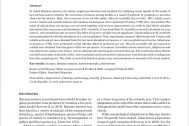Obsah
In visual Batesian mimicry, the mimic acquires protection from predators by imitating visual signals of the model. It has not been known whether the occurrence of mimics among models is a result of selection by predators or an active choice by the mimics. Here, the occurrence of an ant-like spider, Micaria sociabilis Kulczyński, 1897, which occurs on tree trunks and visually imitates arboricolous Liometopum microcephalum (Panzer, 1798) ants, was studied. The fauna of arboricolous ant species was surveyed together with six tree characteristics in order to find which variables determined the occurrence and abundance of Micaria sociabilis. It was found that Micaria sociabilis occurred exclusively on trees where L. microcephalum ants occurred. The effect of any tree variable was not significant. The abundance of Micaria sociabilis increased positively with the abundance of L. microcephalum. Then, experiments using an olfactometer and Y-maze with volatile and contact cues obtained from the two most abundant ant species, L. microcephalum and Lasius fuliginosus
(Latreille, 1798), were performed to find whether Micaria preferred any cue. Micaria sociabilis did not respond to volatile cues obtained from the gaster of the two ant species. In contrast, it avoided contact cues from L. fuliginosus and was attracted to contact cues from L. microcephalum ants and its gaster extract in hexane. The results thus show that Micaria sociabilis associates exclusively with L. microcephalum and is attracted to contact cues from this ant while avoiding cues from the competing ant. This study reveals that Batesian mimics may use kairomones to associate with visual models.
(Latreille, 1798), were performed to find whether Micaria preferred any cue. Micaria sociabilis did not respond to volatile cues obtained from the gaster of the two ant species. In contrast, it avoided contact cues from L. fuliginosus and was attracted to contact cues from L. microcephalum ants and its gaster extract in hexane. The results thus show that Micaria sociabilis associates exclusively with L. microcephalum and is attracted to contact cues from this ant while avoiding cues from the competing ant. This study reveals that Batesian mimics may use kairomones to associate with visual models.



